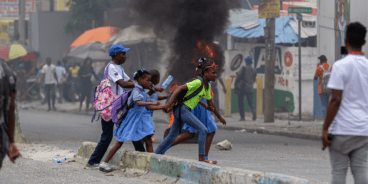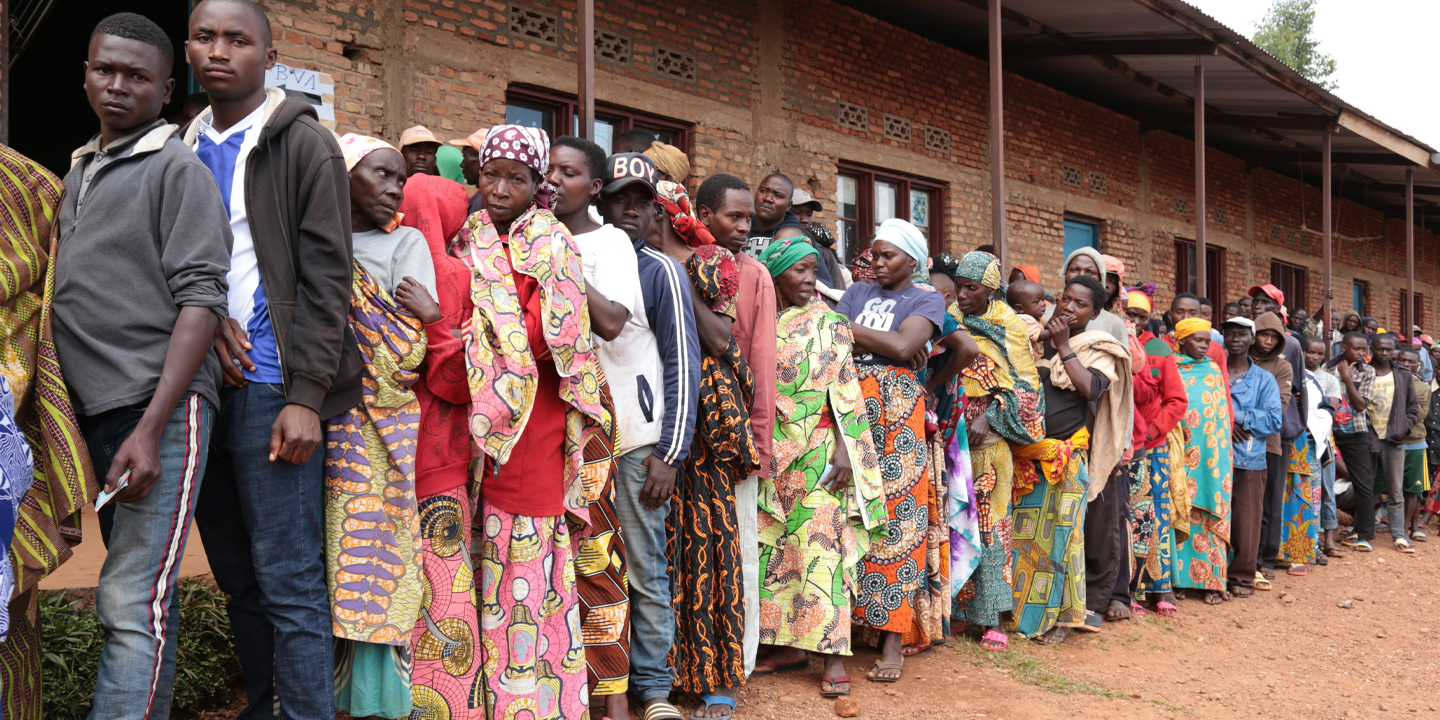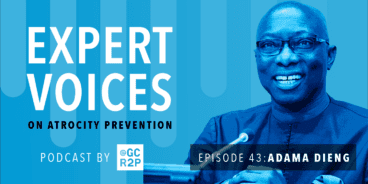

Atrocity Alert No. 204: Burundi, Syria and Rwanda
Atrocity Alert is a weekly publication by the Global Centre for the Responsibility to Protect highlighting situations where populations are at risk of, or are enduring, mass atrocity crimes.
Burundians vote for a new president despite growing violence
Today, 20 May, Burundians went to the polls to vote in the country’s general elections. While many hope the election will result in a peaceful transition of power after nearly 15 years of rule by President Pierre Nkurunziza, today’s vote could exacerbate the country’s protracted political crisis. There were violent clashes between pro-government and opposition supporters during the election campaign. Earlier today the government allegedly blocked WhatsApp, Facebook, Twitter and other social media platforms, inhibiting reporting on the situation inside the country.
During September 2019 the UN Commission of Inquiry on Burundi (CoI) warned that state-led persecution of perceived government opponents had created an environment conducive for political violence. The CoI was especially concerned that the election could trigger renewed crimes against humanity. Since September extrajudicial killings, torture, sexual violence, disappearances and arbitrary detention have all intensified. These acts are often carried out by the National Intelligence Service, police and by the Imbonerakure, the youth wing of the ruling Conseil National Pour la Défense de la Démocratie–Forces pour la Défense de la Démocratie (CNDD-FDD). They have particularly targeted supporters of the main opposition party, Congrès National pour la Liberté (CNL).
Political intolerance and hate speech, as well as the repression of civil society and independent media, has contributed to political instability and the growing threat of atrocities. There are also increasing concerns of potential electoral fraud and that neither the CNDD-FDD nor CNL will accept defeat at the polls. The lack of independent mechanisms capable of resolving election disputes could result in further unrest following the scheduled announcement of results on 4 June.
Between 1993-2005 Burundi experienced a civil war during which atrocities were perpetrated by all sides, and over 350,000 people were killed. Ethnic and political tensions continue to divide Burundian society.
Today’s election also took place despite serious concerns regarding the spread of COVID-19. The government has used COVID-19 as a pretext for further restrictions on the media, to prohibit the diaspora from participating in the elections, and for blocking an Election Observer Mission by the East African Community from monitoring the vote. Last Wednesday, 13 May, authorities also expelled representatives of the World Health Organization from the country, declaring them personae non gratae.
Elisabeth Pramendorfer, Senior Human Rights Officer at the Global Centre for the Responsibility to Protect warned that, “Regardless of the election outcome, following today’s vote all political parties must refrain from inciting further violence and must urge restraint amongst their supporters. The government must de-escalate tensions and uphold its responsibility to protect all Burundians, regardless of their ethnicity or political affiliation.”
Syria’s “ticking time-bomb”: ISIL, atrocities and COVID-19
Despite a formal ceasefire in northwest Syria brokered by Turkey and Russia, attacks against civilians and bombings in populated areas continue. The UN High Commissioner for Human Rights, Michelle Bachelet, warned that the deteriorating situation is a “ticking time-bomb” that must be addressed. She emphasized that, “if the current patterns of violations and abuses continue to spread and escalate, there is a risk the country will enter another spiral of extreme and widespread violence committed with impunity by all parties to the conflict… Blatant disregard for civilian safety runs contrary to the obligations that all parties must uphold under International Humanitarian Law [IHL] and International Human Rights Law [IHRL].”
In particular, the use of Improvised Explosive Devices (IEDs) has drastically increased in recent weeks. Over the past month, 26 IED attacks were carried out in residential neighborhoods, while 7 IEDs were detonated in public markets. Almost all of these attacks have occurred in northern or eastern parts of Syria controlled by Turkish-affiliated armed groups and the Turkish military, or by the Kurdish-led Syrian Democratic Forces (SDF). One of the deadliest attacks took place on 28 April in Afrin, when a fuel truck exploded in a market, killing 29 civilians.
Targeted killings have also increased, particularly in Dara’a Governorate in the south, which is controlled by the Syrian government. The UN Office of the High Commissioner for Human Rights (OHCHR) has documented at least 17 targeted killings of civilians since March. The armed extremist group, the Islamic State of Iraq and the Levant (ISIL), also launched attacks during March and April in areas of Syria from Homs to Deir Ezzour that are controlled by government forces.
OHCHR has warned that the increase in attacks may signal that some parties to the conflict view the COVID-19 pandemic as an opportunity to regroup. SDF fighters have specifically warned of an ISIL resurgence as global attention shifts towards combatting the pandemic.
All government forces and non-state armed groups in Syria must uphold their obligations under IHL and IHRL. In keeping with the UN Secretary-General’s call for a global ceasefire during the COVID-19 pandemic, all parties to the Syrian conflict should immediately halt offensive operations and end all attacks on civilians and civilian objects.
Rwandan genocide fugitive arrested in France
On Saturday, 16 May, French authorities arrested Félicien Kabuga, a Rwandan national and one of the most wanted fugitives accused of responsibility for the 1994 genocide. Between April and July 1994 approximately one million ethnic Tutsis were murdered in Rwanda over a period of 100 days. In 1997 the International Criminal Tribunal for Rwanda (ICTR) indicted Kabuga on a range of charges, including the commission of genocide, complicity in genocide, as well as direct and public incitement to commit genocide.
Kabuga was an influential businessman and a founding director of Radio-Télévision Libre des Mille Collines (RTLM), the radio station that played a central role in inciting the genocide. Under his management, RTLM broadcasts assisted in the identification and killing of Tutsis. Kabuga also allegedly imported machetes to help arm the killers. Ambassador Stephen Rapp, who served as senior trial attorney and chief of prosecutions at the ICTR, remarked that, “The Kabuga case is important because it involves the alleged responsibility of someone who did not fire a gun or swing a machete but provided the means and messaged the motivation to those who would kill hundreds of thousands of their neighbors.”
The ICTR was the first international tribunal established by the UN Security Council. Before closing in December 2015, the ICTR had sentenced 62 people for genocide and other crimes, including high-ranking military and government officials, businessmen, as well as religious and militia leaders. The so-called “Media Trial,” when members of the media were held responsible for inciting acts of genocide, was a historic landmark of the Tribunal. Seven ICTR indictees still remain at large.
Nearly 26 years after the end of the genocide in Rwanda, Kubuga’s arrest should signal to all perpetrators of atrocity crimes that they cannot rely upon the permanence of impunity, regardless of how powerful they may currently seem, or where they might hide. It is likely that Kabuga will face a trial under the UN’s International Residual Mechanism for Criminal Tribunals.
Related Publications


Expert Voices on Atrocity Prevention Episode 43: Adama Dieng
